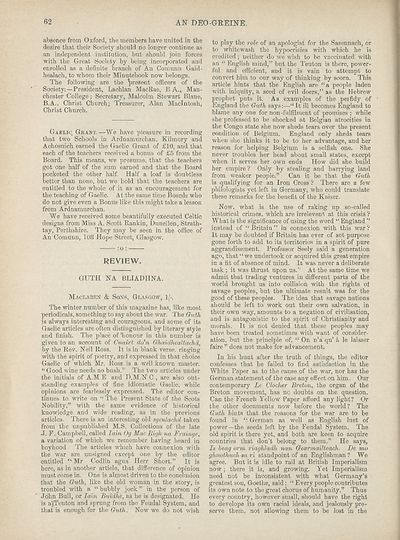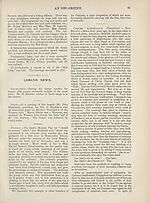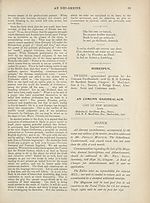An Comunn Gàidhealach Publications > Deo-gréine > Volume 10, October 1914-September 1915
(70) Page 62
Download files
Complete book:
Individual page:
Thumbnail gallery: Grid view | List view

62
AN DEO-GREINE.
absence from Oxford, the members have united in the
desire that their Society should no longer continue as
an independent institution, but should join forces
with the Great Society by being incorporated and
enrolled as a definite branch of An Comunn Gaid-
healach, to whom their Minutebook now belongs.
The following are the present officers of the
Society:—President, Lachlan MacRae, BA., Man¬
chester College; Secretary, Malcolm Stewart Blane,
B.A., Christ Church; Treasurer, Alan Macintosh,
Christ Church.
Gaelic Grant.—We have pleasure in recording
that two Schools in Ardnamurchan, Kilmory and
Achosnich earned the Gaelic Grant of £10, and that
each of the teachers received a bonus of £5 from the
Board. This means, we presume, that the teachers
got one half of the sum earned and that the Board
pocketed the other half. Half a loaf is doubtless
better than none, but we hold that the teachers are
entitled to the whole of it as an encouragement for
the teaching of Gaelic. At the same time Boards who
do not give even a Bonus like this might take a lesson
from Ardnamurchan.
We have received some beautifully executed Celtic
designs from Miss A. Scott Rankin, Dunellen, Strath-
tay, Perthshire. They may be seen in the office of
An Comunn, 108 Hope Street, Glasgow.
REVIEW.
GUTH NA BLIADHNA.
Maclaren & Sons, Glasgow, 1/-.
The winter number of this magazine has, like most
periodicals, something to say about the war. The Outh
is always interesting and courageous, and some of its
Gaelic articles are often distinguished by literary style
and finish. The place of 'honour in this number is
given to an account of Guairt do’n Ghaidhealtachd,
by the Rev. Neil Ross. It is in blank verse, ringing
with the spirit of poetry, and expressed in that choice
Gaelic of which Mr. Ross is a well known master.
“ Good wine needs no bush.” The two articles under
the initials of A.M E and D.M.N C , are also out¬
standing examples of fine idiomatic Gaelic, while
opinions are fearlessly expressed. The editor con¬
tinues to write on “ The Present State of the Scots
Nobility,” with the same evidence of historical
knowledge and wide reading, as in the previous
articles. There is an interesting old sgeulachd taken
from the unpublished M.S. Collections of the late
J. F, Campbell, called Iain Og Mac High na Frainge,
a variation of which we remember having heard in
boyhood. The articles which have connexion with
the war are unsigned except one by the editor
entitled “Mr Codlin agus Herr Short.” It is
here, as in another article, that difference of opinion
must come in. One is almost driven to the conclusion
that the Guih, like the old woman in the story, is
troubled with a “bubbly jock” in the person of
John Bull, or Iain Buidhe, as he is designated. He
is ajTeuton and sprung from the Feudal System, and
that is enough for the Guth. Now we do not wish
to play the role of an apologist for the Sasennach, or
to whitewash the hypocrisies with which he is
credited; neither do we wish to be vaccinated with
an “ English mind,” but the Teuton is there, power¬
ful and efficient, and it is vain to attempt to
convert him to our way of thinking by scorn. This
article hints that the English are “a people laden
with iniquity, a seed of evil doers,” as the Hebrew
prophet puts it. As examples of the peifidy of
England the Guth says:—“ It ill becomes England to
blame any one for non-fulfilment of promises ; while
she professed to be shocked at Belgian atrocities in
the Congo state she now sheds tears over the present
condition of Belgium. England only sheds tears
when she thinks it to be to her advantage, and her
reason for helping Belgium is a selfish one. She
never troubles her head about small states, except
when it serves her own ends How did she build
her empire ? Only by stealing and harrying land
from weaker people.” Can it be that the Guth
is qualifying for an Iron Cross ? There are a few
philologists yet left in Germany, who could translate
these remarks for the benefit of the Kaiser.
Now, what is the use of raking up so-called
historical crimes, which are irrelevent at this crisis ?
What is the significance of using the word “ England ”
instead of “ Britain ” in connexion with this war ?
It may be doubted if Britain has ever of set purpose
gone forth to add to its territories in a spirit of pure
aggrandisement. Professor Seely said a generation
ago, that “we undertook or acquired this great empire
in a lit of absence of mind. It was never a deliberate
task ; it was thrust upon us.’- At the same time we
admit that trading ventures in different parts of the
world brought us into collision with the rights of
savage peoples, but the ultimate result was for the
good of these peoples. The idea that savage nations
should be left to work out their own salvation, in
their own way, amounts to a negation of civilisation,
and is antagonistic to the spirit of Christianity and
morals. It is not denied that these peoples may
have been treated sometimes with want of consider¬
ation, but the principle of, “ On n’a qu’ a le laisser
faire ” does not make for advancement.
In his hunt after the truth of things, the editor
confesses that he failed to find satisfaction in the
White Paper as to the cause of the war, nor has the
German statement of the case any effect on him. Our
contemporary Le Clocher Breton, the organ of the
Breton movement, has no doubts on the question.
Can the French Yellow Paper afford any light? Or
the other documents now before the world? The
Guth hints that the reasons for the war are to be
found in “ German as well as English lust of
power—the seeds left by the Feudal System. The
old spirit is there yet, and both are keen to acquire
countries that don’t belong to them.” He says,
Is beag orm riaghladh nan Gearmailteach. De mo
ghnothuch-sa ri standpoint of an Englishman ? We
agree. But it is idle to rail at British Imperialism
now ; there it is, and growing. Yet Imperialism
need not be inconsistent with what Germany’s
greatest son, Goethe, said: “ Every people contributes
its own note to the great chorus of humanity.” Thus
every country, however small, should have the right
to develops its own racial ideals, and jealously pre¬
serve them, not allowing them to be lost in the
AN DEO-GREINE.
absence from Oxford, the members have united in the
desire that their Society should no longer continue as
an independent institution, but should join forces
with the Great Society by being incorporated and
enrolled as a definite branch of An Comunn Gaid-
healach, to whom their Minutebook now belongs.
The following are the present officers of the
Society:—President, Lachlan MacRae, BA., Man¬
chester College; Secretary, Malcolm Stewart Blane,
B.A., Christ Church; Treasurer, Alan Macintosh,
Christ Church.
Gaelic Grant.—We have pleasure in recording
that two Schools in Ardnamurchan, Kilmory and
Achosnich earned the Gaelic Grant of £10, and that
each of the teachers received a bonus of £5 from the
Board. This means, we presume, that the teachers
got one half of the sum earned and that the Board
pocketed the other half. Half a loaf is doubtless
better than none, but we hold that the teachers are
entitled to the whole of it as an encouragement for
the teaching of Gaelic. At the same time Boards who
do not give even a Bonus like this might take a lesson
from Ardnamurchan.
We have received some beautifully executed Celtic
designs from Miss A. Scott Rankin, Dunellen, Strath-
tay, Perthshire. They may be seen in the office of
An Comunn, 108 Hope Street, Glasgow.
REVIEW.
GUTH NA BLIADHNA.
Maclaren & Sons, Glasgow, 1/-.
The winter number of this magazine has, like most
periodicals, something to say about the war. The Outh
is always interesting and courageous, and some of its
Gaelic articles are often distinguished by literary style
and finish. The place of 'honour in this number is
given to an account of Guairt do’n Ghaidhealtachd,
by the Rev. Neil Ross. It is in blank verse, ringing
with the spirit of poetry, and expressed in that choice
Gaelic of which Mr. Ross is a well known master.
“ Good wine needs no bush.” The two articles under
the initials of A.M E and D.M.N C , are also out¬
standing examples of fine idiomatic Gaelic, while
opinions are fearlessly expressed. The editor con¬
tinues to write on “ The Present State of the Scots
Nobility,” with the same evidence of historical
knowledge and wide reading, as in the previous
articles. There is an interesting old sgeulachd taken
from the unpublished M.S. Collections of the late
J. F, Campbell, called Iain Og Mac High na Frainge,
a variation of which we remember having heard in
boyhood. The articles which have connexion with
the war are unsigned except one by the editor
entitled “Mr Codlin agus Herr Short.” It is
here, as in another article, that difference of opinion
must come in. One is almost driven to the conclusion
that the Guih, like the old woman in the story, is
troubled with a “bubbly jock” in the person of
John Bull, or Iain Buidhe, as he is designated. He
is ajTeuton and sprung from the Feudal System, and
that is enough for the Guth. Now we do not wish
to play the role of an apologist for the Sasennach, or
to whitewash the hypocrisies with which he is
credited; neither do we wish to be vaccinated with
an “ English mind,” but the Teuton is there, power¬
ful and efficient, and it is vain to attempt to
convert him to our way of thinking by scorn. This
article hints that the English are “a people laden
with iniquity, a seed of evil doers,” as the Hebrew
prophet puts it. As examples of the peifidy of
England the Guth says:—“ It ill becomes England to
blame any one for non-fulfilment of promises ; while
she professed to be shocked at Belgian atrocities in
the Congo state she now sheds tears over the present
condition of Belgium. England only sheds tears
when she thinks it to be to her advantage, and her
reason for helping Belgium is a selfish one. She
never troubles her head about small states, except
when it serves her own ends How did she build
her empire ? Only by stealing and harrying land
from weaker people.” Can it be that the Guth
is qualifying for an Iron Cross ? There are a few
philologists yet left in Germany, who could translate
these remarks for the benefit of the Kaiser.
Now, what is the use of raking up so-called
historical crimes, which are irrelevent at this crisis ?
What is the significance of using the word “ England ”
instead of “ Britain ” in connexion with this war ?
It may be doubted if Britain has ever of set purpose
gone forth to add to its territories in a spirit of pure
aggrandisement. Professor Seely said a generation
ago, that “we undertook or acquired this great empire
in a lit of absence of mind. It was never a deliberate
task ; it was thrust upon us.’- At the same time we
admit that trading ventures in different parts of the
world brought us into collision with the rights of
savage peoples, but the ultimate result was for the
good of these peoples. The idea that savage nations
should be left to work out their own salvation, in
their own way, amounts to a negation of civilisation,
and is antagonistic to the spirit of Christianity and
morals. It is not denied that these peoples may
have been treated sometimes with want of consider¬
ation, but the principle of, “ On n’a qu’ a le laisser
faire ” does not make for advancement.
In his hunt after the truth of things, the editor
confesses that he failed to find satisfaction in the
White Paper as to the cause of the war, nor has the
German statement of the case any effect on him. Our
contemporary Le Clocher Breton, the organ of the
Breton movement, has no doubts on the question.
Can the French Yellow Paper afford any light? Or
the other documents now before the world? The
Guth hints that the reasons for the war are to be
found in “ German as well as English lust of
power—the seeds left by the Feudal System. The
old spirit is there yet, and both are keen to acquire
countries that don’t belong to them.” He says,
Is beag orm riaghladh nan Gearmailteach. De mo
ghnothuch-sa ri standpoint of an Englishman ? We
agree. But it is idle to rail at British Imperialism
now ; there it is, and growing. Yet Imperialism
need not be inconsistent with what Germany’s
greatest son, Goethe, said: “ Every people contributes
its own note to the great chorus of humanity.” Thus
every country, however small, should have the right
to develops its own racial ideals, and jealously pre¬
serve them, not allowing them to be lost in the
Set display mode to:
![]() Universal Viewer |
Universal Viewer | ![]() Mirador |
Large image | Transcription
Mirador |
Large image | Transcription
| An Comunn Gàidhealach > An Comunn Gàidhealach Publications > Deo-gréine > Volume 10, October 1914-September 1915 > (70) Page 62 |
|---|
| Permanent URL | https://digital.nls.uk/125240304 |
|---|
| Description | Leabhar 10, Mìos Deireannach an Fhogharaidh 1914 gu Darna Mìos an Fhogharaidh 1915 |
|---|---|
| Attribution and copyright: |
|
| Description | This contains items published by An Comunn, which are not specifically Mòd-related. It includes journals, annual reports and corporate documents, policy statements, educational resources and published plays and literature. It is arranged alphabetically by title. |
|---|
| Description | A collection of over 400 items published by An Comunn Gàidhealach, the organisation which promotes Gaelic language and culture and organises the Royal National Mòd. Dating from 1891 up to the present day, the collection includes journals and newspapers, annual reports, educational materials, national Mòd programmes, published Mòd literature and music. |
|---|---|
| Additional NLS resources: |
|

